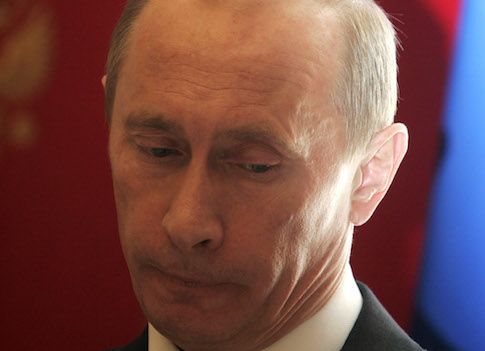Global oil prices continued to plunge on Monday, aiding U.S. consumers at the pump while delivering a blow to oil-rich foreign adversaries.
Crude oil prices have now dropped below $70 a barrel, about $30 cheaper than during the last summer. Prices have plummeted in part due to fracking—an oil and gas extraction technique that has enabled U.S. production to surge.
U.S. adversaries that rely on oil exports to boost their economies are feeling the pinch of lower prices. Oil revenues account for significant portions of the budgets in Russia, Iran, and Venezuela.
William Yeatman, a senior fellow in energy policy at the Competitive Enterprise Institute, said that factors such as Middle East conflicts have historically contributed to price shocks. But the United States is now playing a more influential role on the supply-side of world oil markets.
"In spite of terrible strife [in the Middle East], in addition to other global emergencies (i.e., instability in eastern Ukraine and Ebola afflicting western Africa), the price of oil is declining," he said. "There seems to have been a structural shift and the likely cause is the incredible growth in American oil and gas production, itself due to the advent of technological breakthroughs in drilling collectively known as ‘fracking.’"
Russian President Vladimir Putin on Friday appeared to brush aside concerns of lower oil revenues, noting that "winter is coming." European countries rely on natural gas from Russia especially in colder months.
Still, falling oil prices have driven the Russian currency to its weakest level since the fall of the Soviet Union. Western sanctions imposed after Russia’s destabilizing actions in Ukraine have also hampered its economy.
Additionally, Russia has been accused of funding anti-fracking protests in countries such as Romania and Lithuania—leading to suspicions that the Kremlin is using clandestine measures to prevent U.S. oil companies from stealing its market share.
In the Middle East, some members of the Organization of the Petroleum Exporting Countries (OPEC) were reportedly not pleased with the group’s recent announcement that it would hold off on cutting oil production, a move that could raise prices. Iran’s oil minister said his country did not protest the decision but added that it was not "beneficial to all OPEC member countries."
Western sanctions linked to Iran’s nuclear program previously curtailed its oil exports. However, recent negotiations have provided the Islamic regime with some sanctions relief that will effectively amount to $700 million per month in increased revenues.
Venezuela also expressed reservations about OPEC’s decision not to lower its production ceiling. The South American nation could face a large budget deficit next year if oil prices do not rise above $100 a barrel.
Venezuela has close ties with Iran, and President Nicolas Maduro has long blamed the U.S. for fomenting unrest in his country.
The Keystone pipeline project also presents a threat to Venezuela. The project would transport oil from Canada’s tar sands to the United States. Venezuela generates a similar type of heavy crude product.
U.S. senators rejected a bill last month to authorize construction of the pipeline, but Republicans have vowed to push for the measure again when they assume control of the chamber in January.
